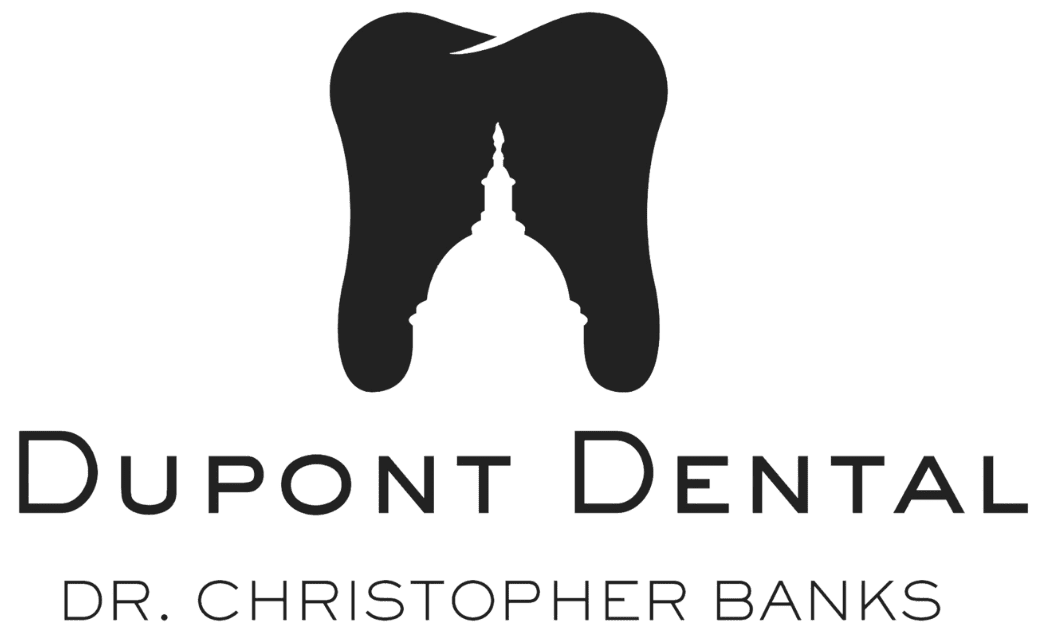Obstructive sleep apnea, or OSA, occurs when sleep positions relax tissues in the throat, obstructing the airway. Patients with sleep apnea can wake up multiple times, gasping for air at night. At Dupont Dental, we provide sleep apnea treatment for patients in Washington, DC.
Addressing sleep apnea can restore patient comfort and open the airway, making breathing easier and improving sleep. Moreover, we provide restorative dentistry treatments in our Washington, DC, office.

Common Signs of Sleep Apnea
Other than pauses in breathing during sleep, sleep apnea patients can experience these symptoms:
- Snoring
- Falling asleep during the day
- Insomnia
- Waking up with a dry throat
- Changes in mood
- Morning headaches
- Dizziness when waking up
- A lack of energy during the day
There are also several sleep apnea risk factors, including excess weight, age, and gender. Patients who are male, over 40, or have excess weight may be more prone to sleep apnea.
Sleep apnea can also worsen heart problems, as periods of apnea minimize the amount of oxygen that reaches the heart. Patients with heart disease or who have experienced heart attacks or strokes are at an increased risk of these problems reoccurring due to sleep apnea.
Am I at High Risk for Sleep Apnea?
There are many different factors that can increase your risk for sleep apnea. For starters, it can be part of your family history. If you know of family members that suffer from sleep apnea, it’s more likely that you’ll suffer from it as well. Men are also more likely than women to have sleep apnea.
Being overweight, obese, or having a larger neck circumference can all make you more susceptible, as can large tonsils. All of these things involve more excess tissue in your throat, making it more likely for these tissues to block your airway. When you’re overweight, you also lack muscle tone, which is an additional risk factor.
Due to the lack of muscle tone, you’re more likely to have sleep apnea if you’re over the age of 45, too. As we age, our muscle tone starts to deteriorate. This makes it harder for our body to do even simple tasks, like sleep. The tongue muscle weakens and it’s more likely to relax into the back of your throat.
Hypertension, high blood pressure, and diabetes go hand in hand with sleep apnea. You’re both more likely to have sleep apnea if you have these problems, and more likely to develop these problems if you have sleep apnea.
The Dangers of Untreated Sleep Apnea
Many people don’t realize how dangerous sleep apnea is if it goes untreated. It’s a lot more than just snoring — it has impacts throughout the body.
First, it impacts your immediate quality of life because you’re more tired and irritable. You’re likelier to fall asleep at the wheel or other inconvenient places. You’re also unable to concentrate, aren’t as good at making decisions, and can have trouble doing simple tasks. In the long run, it can cause issues with your relationships and even get you fired.
As for your mood, you have an increased likelihood of suffering from depression and anxiety. Sleep deprivation can make you have dangerous mood swings and feelings of hopelessness. If you already have existing mental health conditions, sleep apnea aggravates them and makes them worse.
Sleep apnea increases your risk of many physical health conditions. One of the main interactions is it causes problems with the cardiovascular system. When you aren’t getting enough air overnight, your blood oxygen levels decrease. This strains your heart, making you more likely to experience high blood pressure, heart attacks, strokes, and irregular heartbeats. Patients with untreated sleep apnea are significantly more likely to have these issues than those without sleep apnea.
Sleep apnea also correlates with diabetes and obesity. The condition impacts how your body processes glucose and contributes to insulin resistance. Consistent sleep patterns impact how your body gains and loses weight. If you aren’t getting enough sleep, you’re more likely to gain weight and have trouble losing it.
Sleep Apnea Treatment in Washington, DC
Continuous Positive Airway Pressure (CPAP) machines are the traditional treatment for patients with sleep apnea. These machines deliver oxygen through the airway, keeping it open so patients can breathe easier. However, CPAP machines are bulky and can be uncomfortable to wear, as they cover the face. CPAP machines are also not easy to move from room to room.
Dr. Banks works with sleep specialists to provide sleep apnea patients with oral appliances. Once a specialist diagnoses the patient with sleep apnea, Dr. Banks can examine the smile and airway to create the custom appliance.
Patients with mild to moderate forms of sleep apnea can benefit from an oral device. Sleep apnea oral appliances cover the upper and lower teeth and help open the airway by moving the lower jaw forward. Wearing an oral appliance during sleep can help reduce sleep apnea symptoms for patients who want to sleep without interruption.
Get a Good Night’s Sleep
Address symptoms of sleep apnea today with a custom oral appliance. Call Dupont Dental for comfortable care at (202) 946-4720, or request a dental appointment with Dr. Banks online.
